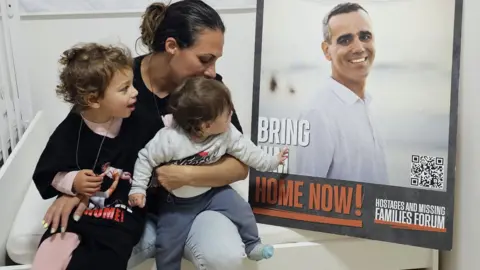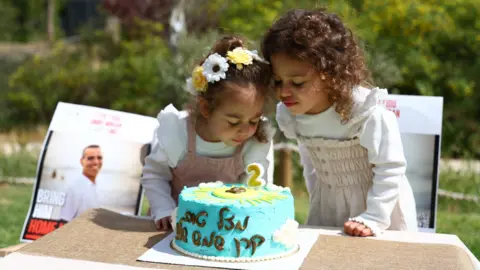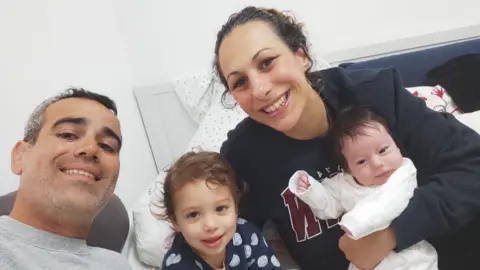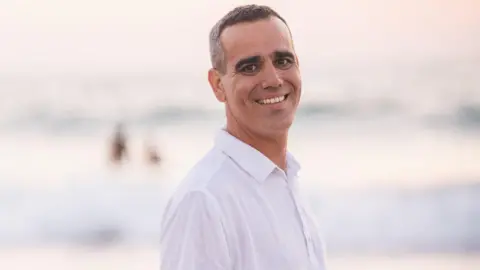As an Israeli hostage turns 48, his wife waits for blue ticks on her messages
 Family handout
Family handoutWhen Omri Miran finally opens his WhatsApp account, he's going to receive a torrent of messages.
Photos of his daughters. Late night musings from his wife, Lishay, as she lies in bed. Snapshots from an Israeli family life that's gone on for 18 painful months without him.
Lishay started sending the messages three weeks after Hamas gunmen violently snatched Omri from their home in Kibbutz Nahal Oz, on 7 October 2023.
She calls the chat Notes to Omri. She's lost count of the number of messages she's sent.
"My love, there are so many people you'll need to meet when you come back," she wrote at the end of October 2023.
"Amazing people who are helping me. Strangers who have become as close as can be."
Three-and-a-half months later, she posted a message from the couple's eldest daughter.
"Roni just said goodnight to you at the window like every night. She says you don't hear her and she doesn't see you… You're really missing from her life and it's getting harder for her to deal with your absence."
 Family handout
Family handoutFriday was Omri's birthday. His second in captivity. As he turns 48, somewhere in the tunnels of Gaza, Lishay will be writing again, with tales of two daughters who were still babies when he last saw them.
Released hostages say Omri was seen alive last July. Lishay's belief in her husband's survival seems unshakeable, but this is the toughest time of the year. Not just Omri's birthday, but also the eve of Pesach (Passover), when Jews celebrate the Biblical story of Exodus, in which Moses led their ancestors out of slavery in Egypt.
"You know, Pesach is the holiday of freedom," Lishay says when we meet in a park near Tel Aviv's Hostages Square.
"I don't feel free. I don't think anyone in Israel can feel free."
In the square itself, Omri's birthday was marked on Friday.
The posters calling for his release once listed the hostage's age as 46. Then 47.
Danny, Omri's father, crossed out both, and wrote 48.
Nearby, preparations were well under way for a symbolic Passover Seder, or ritual feast.
A long table was being set, with places for each of the remaining 59 hostages still in Gaza (of whom 24 are believed to be alive).
The square is full of symbols: a mock-up of a Gaza tunnel, tents to represent the Nova music festival where hundreds were killed.
Along with a merchandise stall to support the families and a "virtual reality hostage experience", it's all part of a collective effort to keep the plight of the missing in the public eye and maintain political pressure on the Israeli government.
Lishay and her daughters have yet to return to the house where family life was blown apart in a few traumatic hours, 18 months ago.
 Family handout
Family handoutBut Lishay says she goes back to Nahal Oz from time to time to commune with her husband.
The kibbutz is just 700m from the border with Gaza. It's as close as she can get to Omri.
"I can feel him over there," she says. "I can speak with him."
After a ceasefire came into effect in mid-January, the border was quiet. Lishay allowed herself to hope, even though she knew Omri's age meant that he would not be among the first to be freed.
But the ceasefire ended after just two months. Now the border area - which Israelis call "the Gaza pocket" - echoes once more to the sounds of war, reigniting the deepest fears of all hostage families.
"I was terrified," she says of her most recent trip.
 Family handout
Family handoutLishay is careful not to condemn her government, as some hostage families have. But she says that when she realised the war had resumed, she was "really angry".
When Israel's Prime Minister Benjamin Netanyahu visited Hungary's Viktor Orban last week, he posted that the two men had discussed "the Hungarian hostage", a reference to Omri's dual Israel-Hungarian citizenship.
For Lishay, it stung.
"I was really, really hard to see this," she says. "Omri has a name. He's not just a hostage."
In a Passover message delivered on Friday, Netanyahu once again promised the families that hostages would return and Israel's enemies would be defeated.
Recent days have seen talk of another ceasefire deal, but it doesn't feel imminent.
"The last time that it happened," Lishay says, referring to the first ceasefire deal in November 2023, "we waited more than a year for another agreement. So now we are going to wait one year more? They can't survive over there."
For now, it seems her WhatsApp messages to Omri are destined to remain unopened.
But that doesn't stop her looking for the grey ticks to turn blue.
"I know someday it'll happen."
